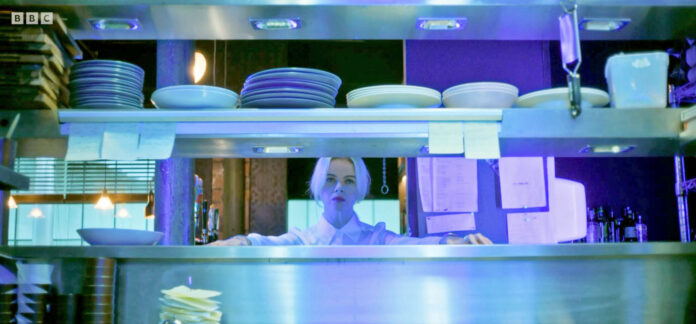‘Too real’ dramatisation of working-class life in cost-of-living crisis
Sare O’Neill, South East London Socialist party
“People like us aren’t allowed to make mistakes” is said by Tara, a waitress struggling to support her widowed mother, to the camera. This is just after the Saw-like scene of a woman tied to her bed is revealed.
A little bit of a fantasy for anyone who has worked in customer service, Tara monologues revenge against a customer who tried to get her fired for bringing the incorrect starter.
This shows the two sides of the same situation, frustrating for both but in different ways. The woman sees the mistake as something annoying, a way to show off to her friends through putting someone else down. For Tara, it’s her life. Losing her job means losing anything she’s managed to scrape together.
Skint is made up of a series of 15-minute unflinching monologues, detailing the experience of a single working-class character. It offers an uninterrupted insight into their lives; these are working-class main characters, not a supporting cast. They’re not the butlers or servers, there to support the upper-class characters. They look directly into the camera, and talk about their lives and experiences. Think Fleabag but less middle class.
Class divide
The class divide, and the conflict that comes from it, is seen in all of the stories. These individuals have been pushed to the limit, something familiar in the current cost-of-living crisis. From tenuous housing, to renting, to mental health, to grief; it gives an insight into the ease with which people can go from struggling, to absolute poverty. There’s simmering frustration and rage, but an inability to do anything about it. It’s not personal failings, its systemic.
The characters each have an overarching storyline, but throwaway lines show the difficultly of surviving day to day as a working-class person. It might be a case of missing a day’s pay due to sickness, or asking “how long will I be able to work for?” when given a fatal diagnosis.
Even with the more understated monologues, like Hannah working a zero-hour contract job with a newborn, who thought “if we were both working, we’d stand a better chance of a decent rental”. She isn’t afforded the Instagram maternity leave she sees on social media, forced back into precarious work in order to keep her head above water. Women in zero-hour care work were among those hit hardest by the pandemic, forced into precarious situations for long hours, for little pay. She wants more for her child, a promise of a better life for the next generation. “It’s a rough patch, that’s all it is”, she says unconvincingly. It shouts of asking the public to struggle through this year, and the next, as a way to get through ‘hard times’.
The thing is – these pieces aren’t speculative. Each one is written and directed by people with direct personal experience of poverty. The novelist Kerry Hudson, for example, is the writer of Hannah’s monologue, with this and her other works being based on personal experience of a difficult and deprived childhood. However, just like the series shows elements of community being used to help others also struggling, this project is being used to create all-important first credits, a foothold into the industry.
Each monologue seems like a deep chat with your friend, not preachy, close enough to tragedy but too real to be overdramatic.
All the characters are trapped in their circumstances, with small glimpses of hope from their community or families, but unable to escape. A show not to be missed. But with Rishi Sunak’s recent budget, it sounds like he may have given it a pass.







